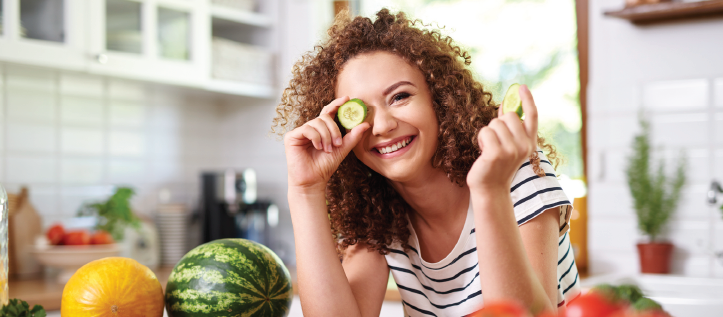Foods for Eye Health

What you eat affects your entire body, from your head to your toes. So it should come as no surprise that incorporating the right foods into your daily diet can be beneficial when it comes to maintaining your eyes and vision as you get older.
What are some of the best foods for eye health? We’ve compiled a list of nutritious, tasty options that are easy to add to meals when cooking at home. And these can make great snacks when you’re hungry in between meals, too.
Foods That Are High in Vitamins A, C, and E
Consuming foods that are high in vitamins A, C, and E can be good for your eyes because these antioxidants help fight free radicals. The inner structures of the eyes, such as the retina and macula, can be damaged by free radicals, so getting enough antioxidants is a smart strategy when you want to keep your eyes strong and avoid problems like macular degeneration and cataracts.
Plus, these vitamins are also good for your eyes in other ways. They can help maintain the right balance of moisture, support the health of your cells and blood vessels, and help you see clearly. Be sure to fill your grocery cart with colorful fruits and veggies!
Here are some examples of foods that are rich in vitamin A:
- Carrots
- Sweet potatoes
- Apricots
- Mangos
- Cantaloupe
Here are some examples of foods that are rich in vitamins C:
- Citrus fruits like oranges, lemons, grapefruits, and tangerines
- Bell peppers
- Cauliflower
- Strawberries
- Bok choy
- Peaches
- Papayas
- Tomatoes
- Brussels sprouts
- Leafy greens, such as collard greens, spinach, and kale
- Broccoli
Here are some examples of foods that are rich in vitamins E:
- Sunflower seeds
- Almonds
- Peanuts and peanut butter
- Hazelnuts
- Avocados
- Leafy greens like spinach
Foods That Provide Your Body with Zinc
Zinc is a mineral that can help support the health of your eyes by protecting them against the damage that can be caused by exposure to light.
Also, getting enough of this nutrient is beneficial because it delivers vitamin A to the retina—another reason to eat a balanced diet!
Here are some examples of foods that are rich in zinc:
- Beans and legumes like lima beans, lentils, kidney beans, chickpeas, and black-eyed peas
- Fortified cereals
- Yogurt
- Oysters
- Pork, beef, and poultry
Foods That Boast Good Fats
EPA and DHA are two types of omega-3 fatty acids, and your eyes need both. When you get enough of these anti-inflammatory fats, you’re taking a step toward maintaining the health of your retina.
These fats can also help with maintaining the right level of moisture to avoid dry eye, and they may help you avoid problems like glaucoma and age-related macular degeneration (AMD) too.
Here are some examples of foods that are rich in omega-3 fatty acids:
- Flaxseeds and flaxseed oil
- Walnuts
- Fish, such as trout, sardines, salmon, halibut, and tuna
Foods That Provide Lutein and Zeaxanthin
Your eyes need antioxidants known as lutein and zeaxanthin, but you have to get these nutrients from your diet because your body can’t make them.
Eating the right foods daily can help ensure you get enough of these carotenoids, which help protect the eyes when they’re exposed to harmful blue light. Plus, lutein and zeaxanthin also support your vision by helping to keep the macula and retina healthy.
Here are some examples of foods that are rich in lutein and zeaxanthin:
- Squash
- Brussels sprouts
- Corn
- Broccoli
- Papayas
- Oranges
- Nectarines
- Peas
- Leafy greens, such as collard greens, spinach, kale, turnip greens, and romaine
- Eggs
Eating Right Is Just One Step in Eye Health Maintenance!
In addition to eating foods that contain nutrients that can support the health of your peepers, it’s also necessary to see an eye doctor on a regular basis. Those checkups are super important because they can detect problems in their earliest stages, sometimes even before symptoms arise. Plus, each appointment gives you the opportunity to talk to your doctor about things you can do for your eyes, so it’s also a way to get valuable advice, whether or not you currently need glasses or contacts to see clearly.
Sources:
https://www.health.harvard.edu/staying-healthy/top-foods-to-help-protect-your-vision
https://www.aao.org/eye-health/tips-prevention/fabulous-foods-your-eyes
https://www.webmd.com/eye-health/ss/slideshow-eyes-sight-foods
